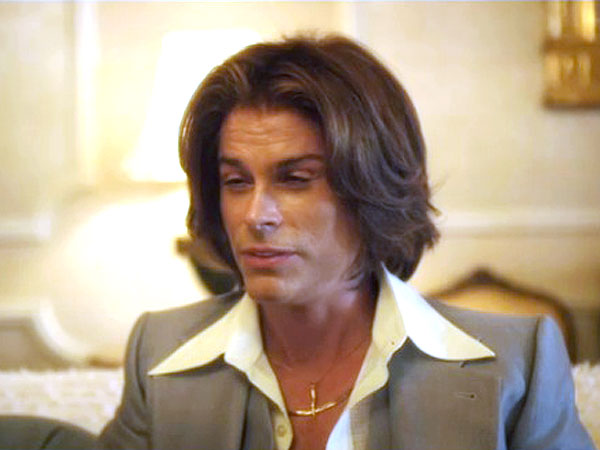David Mermelstein is an AwardsLine contributor.
For some people, Rob Lowe will forever be associated with that group of young actors who emerged in the mid-1980s and remain known as the Brat Pack. But a more considered look at Lowe’s career reveals a steadily evolving performer, now 49—one who has grown from matinee idol to more mature leading man and, most recently, character actor. That last distinction finds its fullest expression thus far in Lowe’s commandingly creepy portrayal of Dr. Jack Startz, the pill-pushing plastic surgeon who handily holds his own opposite Michael Douglas’s Liberace and Matt Damon’s Scott Thorson in Steven Soderbergh’s cinematic swan song, Behind the Candelabra.
How did you land the role of Dr. Jack Startz?
As far as I know, it was a Steven Soderbergh special. I got a call out of the blue that Steven wanted me to do the part. I had been following the project as a fan, thinking this is going to be amazing. I didn’t even need to read the script to know that I wanted to be a part of it. And then when I read it, I was over the moon.
What most appealed to you about the part?
I had a sense that it was a film in which all of the actors were going to be taking pretty big swings. And so it was an environment where it would be appropriate for me to really go for it. In my initial conversations with Steven, I told him I had a take on this character and asked him, “What is your appetite for me to swing for the fences?” What I had in mind would either end my acting career or be a real chance for growth. And that’s the case for everybody’s work on this film, because everybody is putting it out there. There were times when I would be with Matt in these butt-tight Speedos and oiled up with Crisco, and we’d look at each other and laugh and say, “My, what has become of us? This may be the end.” Guys like us don’t get much opportunity to do this kind of a thing. I found the whole thing unbelievably liberating and exciting and, most of all, really, really fun.
Michael Douglas, Matt Damon and Steven Soderbergh have all won Oscars. What it like working with them?
You know going in that you’re surrounded and protected, so you’re free to really take chances. Steven’s career is based on taking chances, and then you see it happening on set—the level of confidence and mastery that he has. It’s like working with Coppola or Bob Zemeckis or any of the guys who have completely mastery of storytelling and working with actors. It’s in their DNA. And Matt has always been one of my favorite actors. I think of his performances in many movies, but especially in The Talented Mr. Ripley, as being as good as anyone could be. And he’s such a nice, decent, great man. Michael is a whole other beast. He is someone I grew up watching and hoping to emulate. One Flew Over the Cuckoo’s Nest, which he produced and won an Oscar for, is the first movie I saw multiple times. That movie changed my life. I even brought a tape recorder into the theater once. And I studied his speeches in The American President before I auditioned for Aaron Sorkin and The West Wing.
What about the physical requirements of the role—the pulled back face, the droopy eyelids. What was it like to be so heavily made up?
I had a very particular look that I wanted to do. I know next to nothing about the real Dr. Startz. The only roadmap I had was the book Behind the Candelabra by Scott Thorson. I had in mind the type of guy you would see in the 1980s with quasi-good seats at Lakers games, a guy of indeterminate sexual orientation, a vaguely transplanted East Coaster who had come to California and then gone off the reservation. So I knew what I wanted. And Steven’s amazing makeup and hair team were able to make it happen. We used tape, wire, rubber bands and a lot of Advil. It was not pretty. Sometimes you have to suffer to be beautiful.
Is there greater freedom playing a character role as opposed to a leading man?
Implicit in that is that I don’t feel free in the leading man roles I do, and that’s not true. I do feel free in those kinds of roles. But inherent in doing a part like Dr. Startz is a level of letting the chips fall where they may. I don’t think you can do that when you’re carrying a movie or a TV series. When that’s your job, you have more of a fiduciary responsibility to serve other masters. But when you can come in and hopefully hit the snot out of a ball and then go back to the dugout, you really have the freedom to only serve yourself and what you’d like to accomplish.
You’ve done some terrific work in recent years, from Robert McCallister on Brothers & Sisters to Chris Traeger on Parks and Recreation and now this. Does it feel like a really great period in your professional life?
It’s good to know people perceive it that way, because it feels very fulfilling to me. And certainly I’m having opportunities in terms of the breadth of roles that I maybe haven’t ever had before. And that’s all an actor can hope for at the end of the day. My hopes and aspirations haven’t changed since I started in this business. They’ve been to be able to play drama, to be able to play comedy, to be able to play leading men, and to be able to play character roles. I have no other aspirations in this regard. To be able to do that is really great, and I’m really enjoying it.

